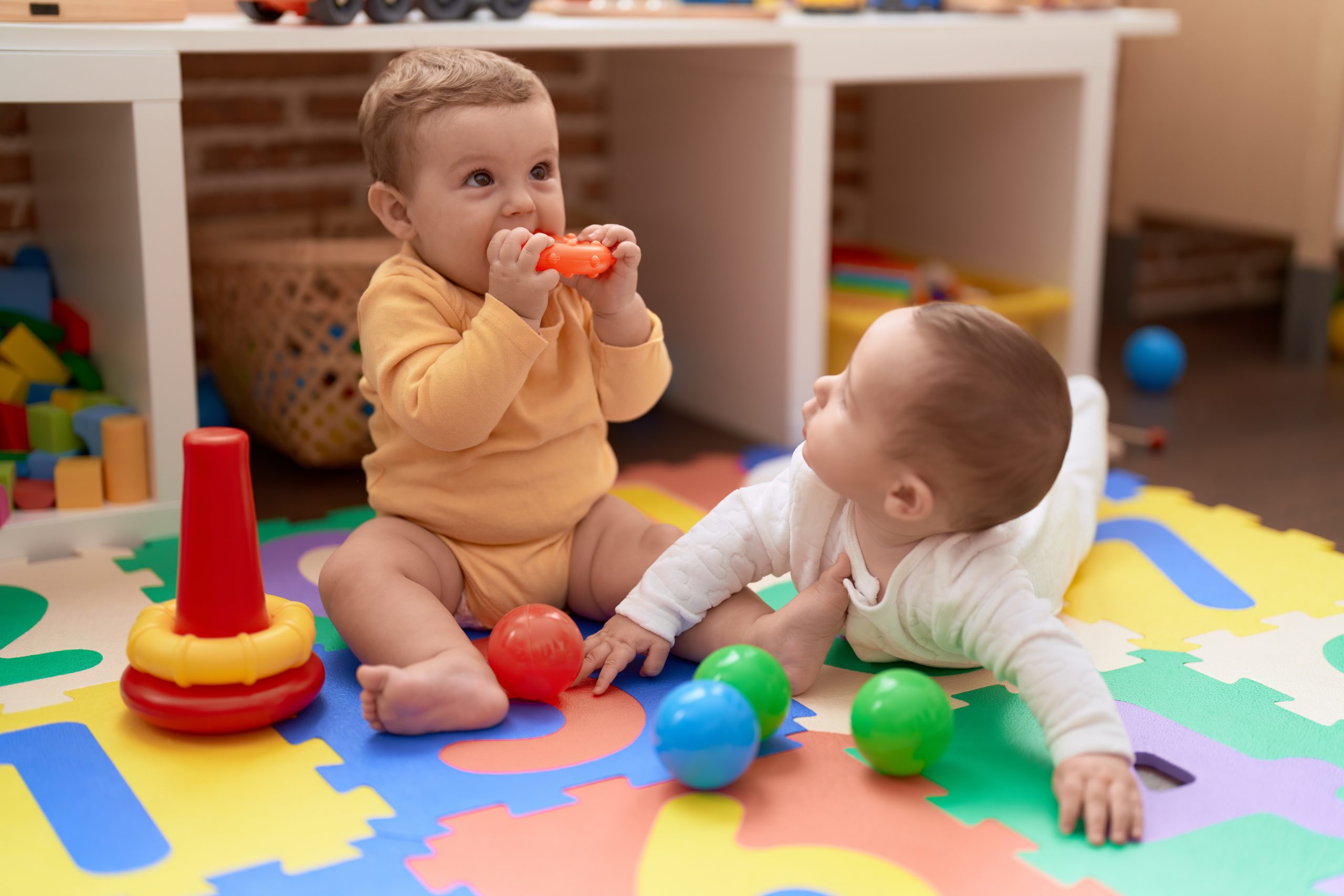Little ones take time to understand themselves and the world around them, passing through different phases of development. Are children self-centred? In short, yes—they are. However, there’s good news: it’s a normal stage in their cognitive development. We’ve explored this in a recent article about Jean Piaget’s four stages theory, and it’s fairly clear to everyone who’s ever interacted with children that they learn and gain skills gradually and over time. One interesting phase of development is egocentrism, predominantly observed in the preoperational stage of a child's cognitive development. Although it’s a time when children don’t think much beyond themselves, egocentrism doesn't reflect a child's arrogance or self-importance. Perceiving the world solely from their own viewpoint is just a foundational part of their learning journey. As they get older, they will begin to understand others’ perspectives.

Understanding Childhood Egocentrism
Definition and Characteristics of Egocentrism
Egocentrism in early childhood development is a phase during which children perceive and interpret their surroundings exclusively from their own viewpoint. This isn't about being selfish or intentionally disregarding others' feelings; it simply reflects their cognitive stage. A child might believe, for instance, that if they can't see someone, that person can't see them either. This simple observation reveals a lot about the world of young learners.
Piaget’s Preoperational Stage and Egocentrism
In educational psychology, this phenomenon was most extensively researched by Jean Piaget. Within Piaget’s framework, egocentrism is recognised as a hallmark of the preoperational stage, typically manifesting between the ages of two and seven. It's during this phase that children exhibit egocentrism most prominently. While they begin to engage in symbolic play and are increasingly articulate, their thought processes remain largely ignorant of the perspectives of others.
The Distinction Between Selfishness and Egocentrism
A common misconception is that childhood egocentrism equates to selfishness. While they may seem similar on the surface, they are fundamentally different. Selfishness stems from a conscious preference for one's needs over those of others. In contrast, egocentrism in early childhood is a natural cognitive phase where children are yet to realise that others might have different viewpoints or emotions from their own. Understanding this distinction is crucial for educators and parents, allowing them to provide young learners with the proper support and environment.
Manifestations of Childhood Egocentrism in Early Years
Recognising each stage of cognitive development can be very insightful for educators and caregivers. Egocentrism is often one that’s misunderstood—so what are the tangible manifestations of this phase?
Language and Communication: Dominance of "I" and "Mine"
One of the earliest and perhaps most obvious signs of childhood egocentrism is the predominance of first-person pronouns in a child's vocabulary, particularly "I" and "mine". Children might repeatedly emphasise what they want, how they feel, or what they believe, often neglecting to consider the desires and feelings of others. This isn't out of any inherent selfishness but simply a reflection of their cognitive world where their perspective is the only one they truly understand. For example, a child might say, "I don't like broccoli, so nobody should have it!"
Inability to Perceive Others' Perspectives: The Three Mountain Task
Jean Piaget devised the 'Three Mountain Task' to illustrate the egocentric nature of children in the preoperational stage. Children were presented with a three-dimensional model of three mountains. When asked to pick from a selection of pictures representing the view from another side of the model (i.e., not their own perspective), younger children typically chose the view from their own standpoint. This highlighted their genuine difficulty understanding that others might see the world differently.
Magical Thinking and Animism
Another manifestation of childhood egocentrism is the belief in magical thinking. Children might believe that their teddy bear feels cold at night or that the sun sets because it's tired. This ascription of life-like qualities to inanimate objects (animism) isn't whimsy; it's a genuine reflection of their current understanding of the world. This phase, where imagination often mingles with their interpretation of reality, is both interesting and important for educators to recognise.

Challenges Posed by Egocentrism
Egocentrism often poses particular challenges to little ones, as well as those caring for and teaching them. Children navigating the world primarily through their own lens can sometimes encounter hurdles in social interaction and emotional understanding, which is frustrating for all involved. Here are some common challenges:
Struggles in Sharing and Cooperation
A child's reluctance or inability to share is one of the primary roadblocks. It's not rooted in selfishness but in the child's genuine inability to perceive another's desire or feelings. When a child states, "That's mine!" they express their understanding from a worldview with them at its centre. As they begin to understand that other people have thoughts and feelings too, they will likely learn to share.
Difficulty Understanding Consequences and Emotions of Others
Children in the egocentric phase often find it challenging to anticipate the consequences of their actions on others. For instance, they might not immediately grasp why pushing another child to get a toy might upset the latter (or hurt them). What might be misattributed as malice is simply an inability to foresee how their actions impact others emotionally.
Frustration for Parents and Educators During This Phase
It’s not just the children who face challenges during this phase; caregivers, parents, and educators might struggle with frustration and misunderstanding. It can be disheartening to be faced with repetitive patterns of egocentric behaviour. However, with knowledge comes power. Recognising that this is a developmental phase can help with patience and also allow adults to use targeted learning strategies. We’ll cover some of those in the next section.
Navigating the Egocentric Phase: Strategies for Parents and Educators
As with many aspects of child development, understanding is only half of the equation. The real challenge is knowing how to guide children through egocentrism and beyond. With the right tools and strategies, parents and educators can transform roadblocks into valuable learning experiences for young minds.
Cultivating Empathy: Storytelling and Role-Playing Exercises
Empathy is the capacity to understand another person's feelings, a skill that develops gradually in children. Storytelling can provide little ones with a window into varied perspectives, allowing children to step into someone else's shoes temporarily. Following the story, role-playing activities encourage children to act out scenarios and further reinforce the lessons of understanding and empathy.
Encouraging Collaborative Activities and Group Games
The cooperation required for group activities and games naturally encourages children to view scenarios from multiple viewpoints. Group games necessitate turn-taking, patience, and an appreciation for others' roles. Classic games such as "pass the parcel" or team-building exercises tailored for younger age groups can be particularly effective.
Patience and Consistent Communication: Using Relatable Examples
Patience is invaluable during this phase. When a child is exhibiting behaviour typical of childhood egocentrism, caregivers and teachers can pause and use a relatable example to explain the situation rather than immediately reprimanding them. For instance, comparing their actions to a familiar story character or a previous situation can provide clarity and encourage empathy.
Setting Boundaries While Fostering Independence
Nurturing independence is crucial. Simultaneously setting boundaries ensures children understand acceptable behaviour limits. For instance, a parent might grant them autonomy in choosing a bedtime story but ensure that they understand bedtime's consistency: a set number of stories and then lights out.
In Summary
If you’ve ever wondered about a toddler’s inability to share toys, you’re not alone. Of all the stages of cognitive development, egocentrism is particularly notable! It can manifest as selfishness and self-centredness, which might be of concern to caregivers or teachers who do not recognise it as a natural stage in cognitive growth. Understanding, patience, and proactive engagement can positively steer children towards empathy and the ability to consider other viewpoints. The foundational understanding laid during this period will play a significant role in learning and social skills as youngsters transition into subsequent stages.
Recommended Reading & Resources:
- The Child's Conception of the World by Jean Piaget - A foundational text discussing the cognitive development stages.
- Mind in the Making by Ellen Galinsky - The seven essential life skills every child needs.
- The Emotional Life of the Toddler by Alicia F. Lieberman - An exploration into the emotional complexities of toddlers.
- The Hurried Child by David Elkind - A guide to understanding the pressures faced by children and how to navigate them.
- Development Through the Lifespan by Laura E. Berk - An expansive look into human development across all stages.

